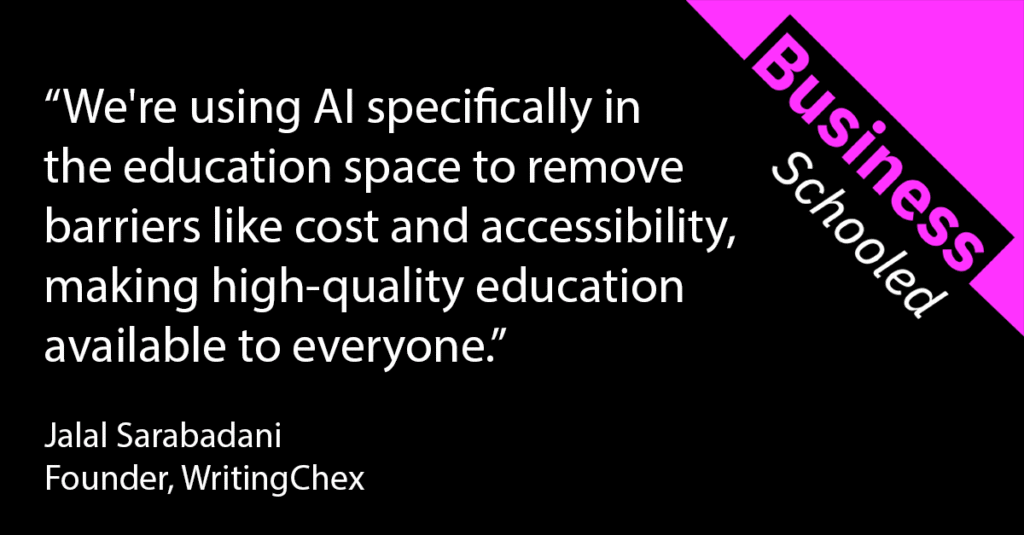Every entrepreneur has an origin story, but few are as instructive as Dr. Jalal “Jay” Sarabadani’s—a former engineering student in Iran who taught himself English, earned a PhD in the United States, and now teaches information systems at San José State University (SJSU), while running the AI‑powered start‑up WritingChex, which is an online platform to help non-English students become proficient in the language and pass the IELTS exam needed to study in the UK or US. His narrative is more than a feel‑good tale; it’s a playbook for business students eager to translate insight into impact.
1. Follow the Friction
Jay’s first insight came not from a market study but from personal struggle: mastering academic writing without easy access to tutors or resources. Instead of viewing that frustration as a dead end, he treated it as market data. If the pain was acute for him, chances were it was widespread.
Take‑away: When something feels unreasonably hard, pause. You might be staring at an opportunity in disguise.
2. Validate Before You Build
WritingChex did not spring fully formed from a brainstorm. Jay and his co‑founders began with interviews and low‑fidelity surveys—asking test‑takers how they prepared, where they stumbled, and what they actually valued. Only after clear patterns emerged (“writing is a nightmare” ranked near the top) did they prototype.
Take‑away: In the lean‑startup lexicon, “love the problem, not your solution.” Data‑rich empathy trumps guesswork every time.
3. Leverage Generative AI for Equity
Plenty of ed‑tech tools promise efficiency, but WritingChex aims for access. By returning IELTS‑style feedback in under 30 seconds—and at a fraction of tutoring costs—the platform helps students from lower‑income regions compete for global scholarships and jobs. AI is not merely automating grading; it is widening the talent funnel.
Take‑away: Technology becomes truly disruptive when it lowers barriers for those historically left out.
4. Keep Humans in the Loop
Yes, WritingChex leans on large language models, yet Jay is quick to note their limits. Cultural nuance, student anxiety, and individualized coaching still demand a human touch. The startup therefore positions AI as the first pass—flagging grammar and coherence—while leaving higher‑order mentoring to instructors or “coaches” who understand local contexts.
Take‑away: The winning formula is rarely AI or people; it’s AI plus people, each focused on what they do best.
5. Iterate at the Speed of Learning
Jay jokes that idea generation now outpaces development capacity. That tension is a feature, not a bug. The team ships minimum‑viable solutions, measures actual usage, and reinvests only when the data warrants. Today’s backlog includes voice‑enabled, multilingual explanations so a learner in any language can ask, “Why did I lose points here?”—and receive a customized answer.
Take‑away: Treat every release as a hypothesis. Your backlog should feel excitingly uncomfortable; otherwise you’re not pushing hard enough.
6. Align with Macro Trends
By striving to make language proficiency more affordable, WritingChex advances multiple UN Sustainable Development Goals—quality education and reduced inequalities among them. This alignment not only broadens social impact but also resonates with grant makers, impact investors, and partner universities.
Take‑away: Building a profitable venture is good; building one that rides a global wave of policy and social momentum is better.
Jay Sarabadani’s trajectory underscores a timeless truth: great companies often begin where personal experience collides with unmet need. Pair that insight with rigorous validation, human‑centered AI, and an agile mindset, and you have more than a startup—you have a blueprint for sustainable advantage.
So the next time a course project or internship leaves you thinking, “There has to be a better way,” remember WritingChex—and consider that you might already be holding your first business model in embryo.

